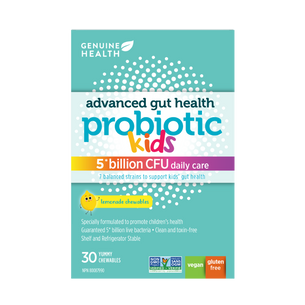A Gastroenterologist’s Tips for Nurturing Your Child’s Gut Health

Did you know that the human gut microbiome is capable of changing in response to various factors including diet, lifestyle, medications (like antibiotics), and environmental exposures?1 Even a mother’s microbiome shifts significantly when she is pregnant, so it may not surprise you to learn that a child’s microbiome shifts, too.1
Normally, when a baby is born vaginally, they pass through the birth canal and come in contact with the bacteria present in the mother’s vagina. This exposure acts as a natural, powerful probiotic boost that helps kickstart the development of the baby’s gut. A baby born through a C-section experiences different initial exposure to the mother’s microbiota as this first encounter with beneficial bacteria is bypassed.2
WHY SHOULD WE CARE ABOUT OUR KIDS’ GUT HEALTH?
The effect on a child’s gut will have ramifications into their adulthood. There has been significant research on the gut microbiome in these past years, and children have been an interesting area of focus.
When a child is born, their gut bacterial diversity is extremely limited.3 During the window of 0-3 years old is when the microbiome matures most rapidly, setting the foundation for adulthood.4 Overtime, as they approach adolescence, microbiome diversity and stability increases.5
In the Canadian Healthy Infant Longitudinal Development (CHILD) Study, researchers looked at the gut microbiome of 300 children aged 3 months old. By analyzing stool samples, researchers were able to identify which children were at risk for developing asthma.6
These results brought up questions of causation and whether the bacteria themselves were what increased asthma risk. To answer this question, researchers then transferred the asthma-positive stool samples into mice models and found that the mice developed asthmatic symptoms.6
Based on this current research, it is clear that the microbiome is a critical part of childhood development. Disruptions in your child’s microbiome can have ramifications into adulthood, affecting future health status.7
Other studies have found that disruptions in the microbiome during this time, can lead to increased risk of your child developing:
· Obesity8
· Type I and II diabetes8
· Celiac disease9
· Asthma8
· Allergic rhinitis (aka seasonal allergies)8
HOW CAN YOU DISRUPT A CHILD’S MICROBIOME?
Many factors can lead to gut dysbiosis (an imbalanced gut microbiome),10 in both adults and children.11 Some things are obvious—like antibiotics. We know that treatment with the antibiotics can have significant negative impacts on gut bacteria and diversity. And you can still see the effects of this damage for years.12 While antibiotics are sometimes necessary, such as a stubborn ear infection, we want to be very cautious about when we use them.
Nutrition is also a big factor. This starts from infancy and extends into childhood. For example, breastfeeding is critically important to child development. Human breast milk has been shown to contain human milk oligosaccharides (HMOs). These HMOs have zero nutritional value for the child.13 However, they are extremely important as they act as food for bacteria, and are prebiotics designed to nourish the healthy bacteria that live inside the newborn child.14 Even past infancy, nutrition remains to be a critical in microbiome development, with factors like malnutrition and high fat diets leading to dysbiosis.11
SO WHAT CAN WE DO TO TAKE CARE OF OUR KIDS?
· Minimize antibiotic exposure whenever possible
· Maximum breastfeeding, for as long as possible
· Ensure your child’s diet is nutrient packed and packed with foods that support gut health (HMOs in breastmilk aren’t the only prebiotics that you can give your children. You can find prebiotics in fruits, vegetables, whole grains, seeds and nuts).15
WHAT ABOUT PROBIOTICS?
Probiotics can be a great way to support your child’s gut health! My son had very bad eczema. We tried everything, but we couldn’t make it go away. We started giving him a probiotic, and we were able to get rid of the eczema in 2 days. If we forgot to give him his probiotic for a few days, his eczema would return. This is just one example of the power you can have as a parent!
Try experimenting with a probiotic supplement as part of your child’s daily routine. Although probiotics can be found in foods like yogurt, or kimchi, it’s not a guaranteed dose of probiotics, and many of them won’t reach your child’s gut.16
advanced gut health probiotic for kids is a great product to reach for and one of the approaches that you can choose to help to support the development of a healthy gut during this critical time. It includes 7 diverse strains consisting of a thoughtful balance of lactobacillis and bifidobacterium providing a unique combination that you can't find in any single strain formula. Also offered in a convenient chewable format so it’s easy for little mouths to take and a delicious lemonade flavour.
Date Modified: February 10th, 2025
REFERENCES
1. Edwards SM, Cunningham SA, Dunlop AL, Corwin EJ. The Maternal Gut Microbiome during Pregnancy. MCN Am J Matern Child Nurs. 2017;42(6):310-317. doi:10.1097/NMC.0000000000000372
2. Inchingolo F, Inchingolo AD, Palumbo I, et al. The Impact of Cesarean Section Delivery on Intestinal Microbiota: Mechanisms, Consequences, and Perspectives—A Systematic Review. Int J Mol Sci. 2024;25(2):1055. doi:10.3390/ijms25021055
3. Khan S, Hansen R, Scott KP, et al. G116(P) The human gut is probably sterile at birth. Arch Dis Child. 2015;100(Suppl 3):A50-A51. doi:10.1136/archdischild-2015-308599.115
4. Laue HE, Coker MO, Madan JC. The Developing Microbiome From Birth to 3 Years: The Gut-Brain Axis and Neurodevelopmental Outcomes. Front Pediatr. 2022;10:815885. doi:10.3389/fped.2022.815885
5. Ronan V, Yeasin R, Claud EC. Childhood Development and the Microbiome: The Intestinal Microbiota in Maintenance of Health and Development of Disease During Childhood Development. Gastroenterology. 2021;160(2):495-506. doi:10.1053/j.gastro.2020.08.065
6. Arrieta MC, Stiemsma LT, Dimitriu PA, et al. Early infancy microbial and metabolic alterations affect risk of childhood asthma. Sci Transl Med. 2015;7(307):307ra152-307ra152. doi:10.1126/scitranslmed.aab2271
7. Yang I, Corwin EJ, Brennan PA, Jordan S, Murphy JR, Dunlop A. The Infant Microbiome: Implications for Infant Health and Neurocognitive Development. Nurs Res. 2016;65(1):76-88. doi:10.1097/NNR.0000000000000133
8. Soderborg TK, Borengasser SJ, Barbour LA, Friedman JE. Microbial transmission from mothers with obesity or diabetes to infants: an innovative opportunity to interrupt a vicious cycle. Diabetologia. 2016;59(5):895-906. doi:10.1007/s00125-016-3880-0
9. Leonard MM, Valitutti F, Karathia H, et al. Microbiome signatures of progression toward celiac disease onset in at-risk children in a longitudinal prospective cohort study. Proc Natl Acad Sci. 2021;118(29):e2020322118. doi:10.1073/pnas.2020322118
10. DeGruttola AK, Low D, Mizoguchi A, Mizoguchi E. Current understanding of dysbiosis in disease in human and animal models. Inflamm Bowel Dis. 2016;22(5):1137-1150. doi:10.1097/MIB.0000000000000750
11. Saeed NK, Al-Beltagi M, Bediwy AS, El-Sawaf Y, Toema O. Gut microbiota in various childhood disorders: Implication and indications. World J Gastroenterol. 2022;28(18):1875-1901. doi:10.3748/wjg.v28.i18.1875
12. Patangia DV, Anthony Ryan C, Dempsey E, Paul Ross R, Stanton C. Impact of antibiotics on the human microbiome and consequences for host health. MicrobiologyOpen. 2022;11(1):e1260. doi:10.1002/mbo3.1260
13. Dinleyici M, Barbieur J, Dinleyici EC, Vandenplas Y. Functional effects of human milk oligosaccharides (HMOs). Gut Microbes. 15(1):2186115. doi:10.1080/19490976.2023.2186115
14. Masi AC, Stewart CJ. Untangling human milk oligosaccharides and infant gut microbiome. iScience. 2021;25(1):103542. doi:10.1016/j.isci.2021.103542
15. Allan S. Prebiotics vs Dietary Fibre. Canadian Digestive Health Foundation. July 19, 2022. Accessed January 29, 2025. https://cdhf.ca/en/prebiotics-vs-dietary-fibre/
16. Office of Dietary Supplements - Probiotics. Accessed January 29, 2025. https://ods.od.nih.gov/factsheets/Probiotics-HealthProfessional/


















































